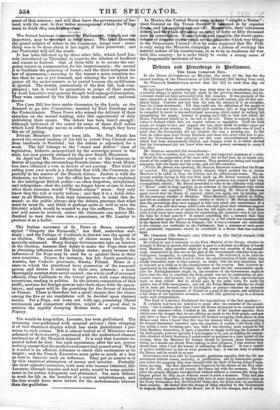The Italian successor of St. Peter. at Rome, commonly styled
"Gregory the Sixteenth," has died, somewhat sud- denly; and the College of Cardinals is thrown into the agony of an election. The usual difficulty of choice seems likely to be specially enhanced. Many foreign Governments take an interest in the election, because they desire to make the Pope their tool in obtaining influence over the Italian states; many because the influence of the Pope may be used for or against them in their own countries. France, for instance, has her Jesuit questions; Austria, her Catholic provinces' Russia, Poland. Rome is a state in which the priesthood have possession of the temporal power, and devote it entirely to their own interests : a more thoroughly corrupt state never existed ; the whole staff of reverend officials, from Cardinals to the lowest grade, with some shining exceptions, trading in politics. In the intense competition of that traffic, services for foreign powers take their share with the specu- lators; and eager will be the gambling for the favour of Austria or France. There is therefore but a small chance that the choice among the five or six candidates will be decided upon abstract merits. Yet a Pope, not worn out with age, possessing liberal sentiments and competent abilities, might do a good deal to retrieve the rapidly decaying Roman state, and redeem the Papacy.


























 Previous page
Previous page